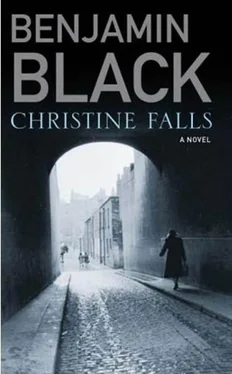Somewhere behind them a bell began to clang with a hectic urgency.
“Power?” Quirke said. “What kind of power?”
“Power over people. Over their souls.”
Souls. The word had a ring to it, urgent and dark like the peals of the bell. A planter of souls, Josh Crawford had said.
They did not speak for the space of half a dozen paces. Then the nun said:
“They care nothing for the children. Oh, they think they do, but they don’t. Their only interest is to see them grow up and take their place in the structure they’ve devised.” She paused, and gave a meager laugh. “St. Mary’s, Mr. Quirke, is a forcing house for the religious. The children are delivered to us, some no more than a few weeks old. We make sure they’re healthy-that’s my job, by the way, I’m a physician”-again she laughed thinly-“and then they’re…distributed.” The bell had stopped. The birds, at some sound in the aftermath of the pealing that only they could hear, flew up in a flock, their wings whirring, then quickly settled again. “We hand them out to good Catholic homes, people we can trust-the respectable poor. Then when the children are old enough they are taken back and put into seminaries and convents-whether they want to be or not. It’s a machine for making priests, for making nuns. Do you see?”
She looked at him sidelong. He was frowning.
“Yes,” he said, “I see. Only…”
She nodded. “But it doesn’t seem so bad, right? Taking in orphans, finding them good homes-”
“I was an orphan, Sister. I was glad to get out of the orphanage.”
“Ah,” she said, and nodded once more. They had come again in sight of the Buick; the engine was going, and pallid wisps of smoke were trailing from the exhaust pipe. They stopped. “But you see, it’s unnatural, this thing, Mr. Quirke,” the nun said. “That’s the point. When bad folk take it on themselves to do what are supposed to be good works it makes a sulfurous smell. I think you’ve had a whiff of it, that smell.”
“Tell me about the child,” he said. “Tell me about Christine Falls.”
“No. I’ve told you too much already.”
He thought: Just like Dolly Moran did .
“Please,” he said. “Things have happened, wicked things.” She cast a glance inquiringly at the walking stick. “Yes, this,” he said, “but worse, too. Far worse.”
She looked down. “It’s cold, I have to go back.” Yet still she stood, gazing at him thoughtfully. Then she came to a decision. “What you should do, Mr. Quirke,” she said, “is ask the nurse, the one who looks after Mr. Crawford.”
“Brenda?” He stared. “Brenda Ruttledge?”
“Yes, if that’s her name. She knows about the child, about little Christine. She can tell you, some of it, anyway. And listen, Mr. Quirke.” She was looking past him to where the Buick waited on the drive. “Watch out for yourself. There are people-there are people who are not what they seem, who are more than they seem.” She smiled at him, this huge man standing stooped before her, asking his awkward questions. Yes, she thought: an orphan . “Good-bye, Mr. Quirke,” she said. “I wish you well. From the little I’ve seen of you, I think you’re a good man, if only you knew it.”
MOSS MANOR WHEN QUIRKE GOT BACK TO IT GAVE THE IMPRESSION OF having been flung wide open, like a door. There was an ambulance outside and a pair of automobiles, and in the entranceway two grave, sober-suited men were engaged in a hushed conversation; they paused and looked at him with curiosity as he entered but he ignored them and went through into the house and lurched from room to room. He was angry again, he was not sure why, exactly, for what he had learned from Sister Anselm had not been news to him, not really. He had begun to consider the possibility that this unfocused anger would be the condition of his life from now on, that he would have to keep bouncing along before it helplessly forever, like a piece of litter buffeted by an unceasing wind. In the main drawing room he came upon the mousy maid, he could not remember her name, arranging dried flowers in a vase on the lid of the grand piano on which he was certain no one had ever played a note. A great fire of logs was burning in the fireplace. The maid quailed before him. He asked her where Miss Ruttledge was. She looked blank. “The nurse,” he said, beginning to shout, and thumping his stick on the floor, “Mr. Crawford’s nurse!” She told him Brenda was with Mr. Crawford now, and that Mr. Crawford was very poorly, and her lower lip trembled. He turned from her and hauled himself up the staircase, cursing the dead weight of his leg. At what he knew to be Josh Crawford’s room he knocked perfunctorily and pushed open the door.
The scene within had the unreally dramatic composition of a painting, a genre scene of a deathbed with attendant mourners. Josh Crawford lay on his back as on a high, white catafalque, his arms resting by his sides over the covers, the jacket of his pajamas thrown open to reveal his huge, heaving chest all furred over with steel-gray hair. An oxygen mask was strapped to his face, and his breaths came in long, laborious rattlings, as if he were hauling on a chain inside him, link by painful link. Phoebe sat on a chair by the bed, leaning forward and holding one of her grandfather’s hands in both of hers. Brenda Ruttledge stood close behind her, stylized in her white outfit and her jaunty little hat, the painter’s very model of a nurse. On the other side of the bed Rose Crawford stood with one arm folded and a hand lifted to her chin, another stylized figure, representing something certainly unsuitable to her, such as patience, or fidelity, or wifely calm. Hearing him at the door Brenda Ruttledge turned, and with a jerk of his head he signaled to her to come out into the corridor. She did so, and closed the door softly behind her. She was about to speak but he cut her off with a chopping gesture of his hand and demanded:
“Was it you who brought the child?” She frowned, and there came into her face a sliver of guilty fear. “Come on,” he said harshly, “tell me.”
“What child?”
“What child, what child! Christine, her name was. Did they make you bring her over here with you?”
She stared at him, shaking her head.
“I don’t know what-”
The door opened and Phoebe leaned out, ignoring Quirke.
“Quick,” she said to Brenda, “you’re needed.”
She stepped back inside the room and Brenda hurried after her. Before the door was shut, however, Rose Crawford slipped out in her place.
“Come on,” she said to Quirke in a deadened voice, “I need a cigarette.”
He followed her downstairs, to the drawing room. He expected to find the maid still loitering there, but she was gone. Rose walked to the fireplace and took two cigarettes from a lacquered box on the mantelpiece and lit both of them and handed one to Quirke.
“Lipstick,” she said. “Sorry.”
He went and stood at the window. Outside, scant snow was falling in soft, flabby flakes. From here he could see a flank of the Crystal Gallery, a cliff of glass rising sheer against the leaden sky.
“I’m sorry,” Quirke said. She looked at him inquiringly. “It can’t be easy for you,” he said, “waiting for the end.”
He was trying to remember what it was called, that labored breathing of the dying; there was, he knew, a technical name for it. He had forgotten so many things.
Rose shrugged.
“Yes. Well.” She touched a log in the fire with the tip of her shoe. “Phoebe has been very good with him,” she said. “I would not have thought she had it in her. She’s in his will, you know.”
“Oh?” He turned from her to the window, a sort of flinching. It was not news to him and yet it rankled to hear her say it; Quirke had made no will for anyone to be in.
Читать дальше












